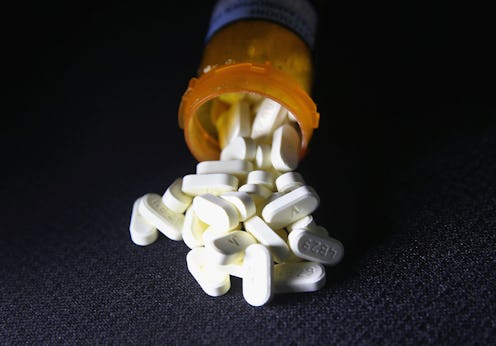
It's difficult to actually pay attention to the long list of side effects that come with most medications. When a drug says it can increase your risk for dozens of conditions, it's easier to just ignore the side effect label and hope that the medication works as intended. But a new study is reminding us why we should pay attention to how medication affects us: One-third of American adults may be taking medication that can cause depression, and there's a chance you may not even know that you're at risk. The study, published in the Journal of the American Medical Association, found that adults who take medication that list depression as a side effect are more likely to develop the condition.
Researchers from the University of Illinois at Chicago studied more than 26,000 adults over a nine-year period. Nearly 10 percent of the study's participants were taking three or more increased-risk medications at the same time, and the results found that the more medications of this kind the subjects took, the more they were at risk for depression. If you're taking three or more medications, you're three times more likely to develop depression — 15 percent of people on the medications had depression. Compare that to the general depression rate, where only 4.7 percent of the population is affected, according to the study.
The New York Times reports that more than 200 common medications warn about an increased depression and suicide risk. According to the Times, the list includes medication for birth control, acid reflux, anxiety, and prescription-strength ibuprofen. A 2016 study found that the majority of people don't read side effect information, and one of the main reasons is that we feel like we know enough about our bodies and our medical conditions that we don't need additional information. It's alarming to hear, but think about it: When's the last time you read a drug's warnings and potential adverse effects? I only learned that an anti-anxiety drug I've taken for five years can increase suicide risk in the course of reporting this article.
With any study, there are caveats to consider. Study author Mark Olfson told NPR that researchers can't say that the medications are definitively causing depression. "We're just showing that if you're already taking them, you are more likely to be depressed," he said. Depression is a complicated disorder that can be triggered by genetics, traumatic life events, health problems, and a range of other things. But if you receive a depression diagnosis while you're taking a medication that lists depression as a side effect, it may be smart to talk to a medical professional about the potential causes.
Lead author Dima Qato says in a press release about the research that patients should stay aware about the risks of medication. We expect our doctors and pharmacists to warn us, but that's not always what happens. "People are not only increasingly using these medicines alone, but are increasingly using them simultaneously, yet very few of these drugs have warning labels, so until we have public or system-level solutions, it is left up to patients and health care professionals to be aware of the risks," she says.
Websites like WebMD, Everyday Health and Drugs.com offer lists of prescription medication side effects, but the safest way to learn about side effects is to reach out to your pharmacist. "Many may be surprised to learn that their medications, despite having nothing to do with mood or anxiety or any other condition normally associated with depression, can increase their risk of experiencing depressive symptoms, and may lead to a depression diagnosis," Qato notes in the press release.
This study isn't recommending that you stop taking medication cold turkey. Instead, you should try to make informed decisions about the drugs you take and the potential risks, especially if you're already dealing with depression.